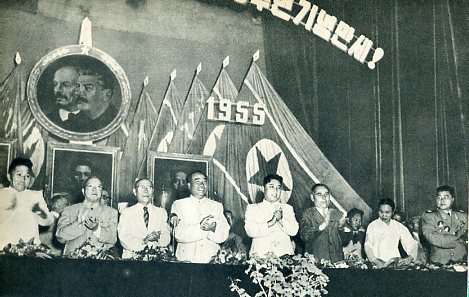|
New People's Party Of Korea
The New People's Party of Korea () was a communist party in Korea. It was formed on 16 February 1946 by Korean Communists who had been exiled in China, later known as the Yan'an faction. The New People's Party had more moderate positions in some issues compared with the Communist Party of Korea, therefore it was rather popular with a wide range of Korean people. The leader of the party was Kim Tu-bong. On 22 July 1946 the northern section of the Communist Party of Korea joined with the New People's Party, the Democratic Party and the Party of Young Friends of the Celestial Way (supporters of an influential religious sect) to form the United Democratic National Front which put all of North Korea's parties under the "leading role" of the Communists. Then, on 29 July 1946, the northern members of the New People's Party and the held a joint plenum of the Central Committees of both parties and agreed to merge into a single entity. A founding conference was held on 28–30 August, ... [...More Info...] [...Related Items...] OR: [Wikipedia] [Google] [Baidu] |
Kim Jae-bong
Kim or KIM may refer to: Names * Kim (given name) * Kim (surname) ** Kim (Korean surname) *** Kim family (other), several dynasties **** Kim family (North Korea), the rulers of North Korea since Kim Il-sung in 1948 ** Kim, Vietnamese form of Jin (Chinese surname) Languages * Kim language, a language of Chad * Kim language (Sierra Leone), a language of Sierra Leone * kim, the ISO 639 code of the Tofa language of Russia Media * ''Kim'' (album), a 2009 album by Kim Fransson * "Kim" (song), 2000 song by Eminem * "Kim", a song by Tkay Maidza, 2021 * ''Kim'' (novel), by Rudyard Kipling ** ''Kim'' (1950 film), an American adventure film based on the novel ** ''Kim'' (1984 film), a British film based on the novel * "Kim" (''M*A*S*H''), a 1973 episode of the American television show ''M*A*S*H'' * ''Kim'' (magazine), defunct Turkish women's magazine (1992–1999) Organizations * Kenya Independence Movement, a defunct political party in Kenya * Khalifa Islamiyah Mindana ... [...More Info...] [...Related Items...] OR: [Wikipedia] [Google] [Baidu] |
Kim Tu-bong
Kim Tu-bong (16 February 1889 – March 1958 or later) was the first Chairman of the Workers' Party of North Korea (a predecessor of today WPK) from 1946 to 1949. He was known in Korean history as a linguist, scholar, revolutionary and politician. His most famous work was under Ju Sigyeong; later, after participating in the March 1st Movement, he with other Korean leaders of the time established a provisional government-in-exile in China, and because of his communist beliefs he played an important role in the early North Korean communist government. He and other members of the Yan'an faction formed the New People's Party when they returned from exile. After the New People's Party merged into the Workers Party of North Korea (WPNK) in 1946 at the 1st WPNK Congress, he became WPNK Chairman. He was the first head of state ( Chairman of the Presidium of the Supreme People's Assembly) of North Korea from 1948 to 1957. He is most remembered in South Korea for his efforts in esta ... [...More Info...] [...Related Items...] OR: [Wikipedia] [Google] [Baidu] |
History Of The Workers' Party Of Korea
The History of the Workers' Party of Korea (WPK) encompasses the period from 1949 onwards. Founding According to North Korean sources, the origins of the Workers' Party of Korea can be traced to the Down-with-Imperialism Union, which was supposedly founded on October 17, 1926 and led by Kim Il-sung, then 14 years old. It is described in these sources as "the first genuine revolutionary communist organization in Korea." The Workers' Party of North Korea was formed on 29 August 1946 from a merger between the Communist Party of North Korea and the New Democratic Party of Korea. On June 30, 1949, the Workers Party of North Korea and the Workers' Party of South Korea merged, forming the Workers' Party of Korea, at a congress in Pyongyang. Both parties traced their origins to the Communist Party of Korea. Kim Il-sung of the Workers Party of North Korea became the party Chairman and Pak Hon-yong, who had been leader of the Workers Party of South Korea as well as the earlier Communi ... [...More Info...] [...Related Items...] OR: [Wikipedia] [Google] [Baidu] |
Defunct Political Parties In Korea
Defunct (no longer in use or active) may refer to: * ''Defunct'' (video game), 2014 * Zombie process or defunct process, in Unix-like operating systems See also * * :Former entities * End-of-life product An end-of-life product (EOL product) is a product at the end of the product lifecycle which prevents users from receiving updates, indicating that the product is at the end of its useful life (from the vendor's point of view). At this stage, a ... * Obsolescence {{Disambiguation ... [...More Info...] [...Related Items...] OR: [Wikipedia] [Google] [Baidu] |
Communist Parties In Korea
Communism (from Latin la, communis, lit=common, universal, label=none) is a far-left sociopolitical, philosophical, and economic ideology and current within the socialist movement whose goal is the establishment of a communist society, a socioeconomic order centered around common ownership of the means of production, distribution, and exchange which allocates products to everyone in the society.: "One widespread distinction was that socialism socialised production only while communism socialised production and consumption." Communist society also involves the absence of private property, social classes, money, and the state. Communists often seek a voluntary state of self-governance, but disagree on the means to this end. This reflects a distinction between a more libertarian approach of communization, revolutionary spontaneity, and workers' self-management, and a more vanguardist or communist party-driven approach through the development of a constitutional socialist st ... [...More Info...] [...Related Items...] OR: [Wikipedia] [Google] [Baidu] |

